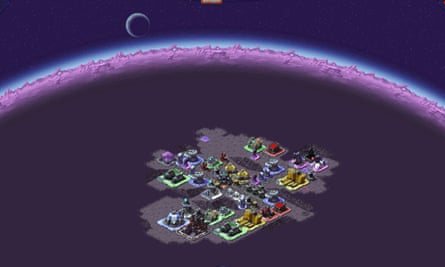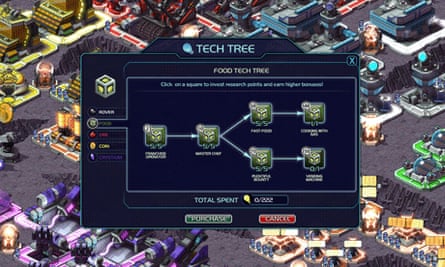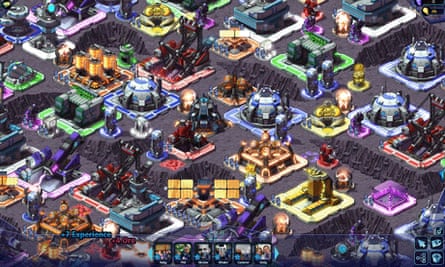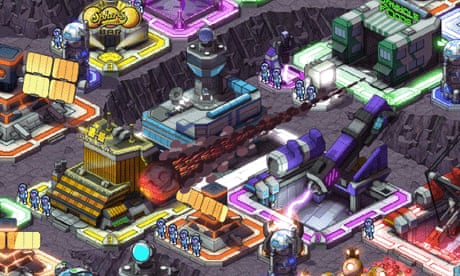Released last month, the intergalactic colonisation game Lucky Space is not like other Facebook management titles. Sure, it looks a little like Zynga's all-conquering Cityville, and it includes a virtual currency – Space Bucks – which can be topped up via in-game payments.
But designed by a bunch of ex-staff from companies like EA, Valve, Activision and Sony it seems like a genuine attempt to bring 'hardcore' depth to the social gaming scene. Players are dumped on an uninhabited planet and must build a functioning space base that caters for the needs of the human colonists, while adhering to a workable structure. There's also a plot (following the lives of five different characters as they seek to plunder the planet's resources) and an emphasis on exploration – both elements missing from most Facebook construction sims. And apparently, most players spend over 30 minutes in their first session, which is rare for a social gaming title.
It's the visuals that grabbed me though. The neat isometric design recalls the PC sims of the early 2000s – the likes of Sid Meier's Alpha Centauri and Space Colony. Developer, A Bit Lucky, seems to be aiming beyond the current generation of Facebook-squatting Zynga wannabes.
Next month, A Bit Lucky is adding a bunch of new features to the game, including multiplayer co-op and competitive challenges, promising a form of gameplay that's not been seen on the platform before. To find out more about the studio and its approach to social game development I spoke to founder and CEO, Frederic Descamps.

In what ways are you pushing the Facebook gaming platform technically? You've developed a very fast Flash engine haven't you?
Our primary goal at ABL is to produce games that reflect a very high production quality in terms of art, graphics and animation. Our games are also quite powerful from a technical standpoint – Lucky Train and Lucky Space have among the fastest, if not the fastest, graphic engines in Flash on Facebook. We can display a large variety of items and animations on screen – including glow effects, special effects, etc. In general our game environment feels like a living and breathing place.
What were your inspirations for the game? Did you look at PC strategy sims like Civ or Sim City, or at Facebook titles like Farmville? What aspects did you take from those?
The true inspiration for Lucky Space is a mix between today's social games and the hardcore PC games of the 1990s. We've also incorporated elements of MMOs in our game. Some people have commented that the graphics in Lucky Space are reminiscent of Starcraft and that our game is actually a love letter of sorts to sci-fi fans. It's almost a mini game in itself to identify all the sci-fi references in Lucky Space!
It seems the sim element of the game is backed up with a mission structure and an over-arching narrative, which is rare in facebook titles - how challenging was that to implement?
You're right - as part of creating a deeper gameplay experience for social gamers we present the players with five different protagonists and each of them has different quests, story lines, and missions we build into the game. Originally we started building quests in a very mechanical way with the goal of teaching people how to play, but quickly realised that some people were paying a lot of attention to the story and underlying humor. At this point, we decided to base the game story around these quests. The protagonists along with the quests try to convey a humorous tone.
Did you always have more 'hardcore' gamers in mind with this game?
We've heard from several players who say that Lucky Space is the first social game that makes them think. Lucky Space is a complex game with resource management and tech tree elements; it's really aimed at people who enjoy playing the spreadsheet behind the game, people who play to crack the equations to become faster than their friends. The choices they have to make when playing the game do matter.

You've gone for a virtual goods freemium model, rather than one that gives players earlier access to premium content - why is this? What drew you to that model?
The game is indeed based on the Free to Play model. However we prefer to actually call it Free to Pay – i.e., you have the choice to pay if you want to at any point in the game as there are many ways to play Lucky Space. Gabe Newell, who I consider one of the smartest visionaries in tech and gaming, brought this concept back to centre stage recently. Giving us money is just one way to access a high level of energy or components, or to advance deeper into the game at a faster pace. Also, as compared to our first title Lucky Train, the game is less based on virtual goods and more based on consumables – energy, components, etc...
Players are able to visit the bases created by friends and can help each other with missions. How do you ensure this social aspect doesn't become too intrusive? I'm always very wary of playing Facebook titles as I don't want to have to spam friends who aren't playing and aren't interested...
We give you the choice to play the game on your own or with friends. But coming from a hardcore online gaming development background, we know that the most fun players can have is to play with friends. We want to give you the opportunity to do this in Lucky Space in a meaningful way. To give a more concrete example, we provide a Wish List feature from which you can get components, blue prints, and more from your friends. We're seeing players coming back and using the Wish Lists which, we hope means they find it a very fulfilling experience to help their friends while playing the game.

How have you been affected by the changes in Facebook privacy policies over the last year?
The changes that Facebook has made have drastically cut down the ability to acquire users virally. This was a key advantage of the Facebook platform. It is now extremely hard to reach a high level of users without a large pre-existing userbase or large advertising budgets, like the larger gaming companies have.
We completely understand why Facebook made such changes as some of these viral channels were abused to spam all Facebook users, which was in turn detrimental to the user experience. However, a good question to ask ourselves is – when was the last time you saw an indie hit on Facebook? This happens routinely on other platforms such as iOS, Steam, Android... The point is that it's really hard for independent game developers to get any traction on their own. This is an issue that Facebook needs to fix to help smaller developers with potentially great high quality games get discovered.
What elements are going to shape Facebook games over the next year?
It's really just the beginning of social gaming. The market has been in existence for just four years. Going forward, we're going to see more innovation and more game genres being brought to Facebook. On the technical side, we see a real yearning for the depth and quality of games seen on other platforms outside of social gaming. Facebook is the largest gaming platform in the world and its future is about encouraging the best possible game developers to come to its platform. The better the quality games, the better retention possibilities exist on the platform. What's very exciting is for us to see the integration of Flash 11 and Unity which in turn allows any Unity game to be ported directly into Flash.
Have you thought about any other platforms, such as smartphones and console digital services like PSN or XBLA? Those are become much more social now.
We believe the future is "Transplatform Gaming" – the same game should be accessible from multiple platforms... whether it's the full game or selected slices of the game. As gamers, this is what makes most sense to us. If you like a game, you should be able to access it via PC, IOS, Android, XBLA, etc. And as a game developer, you want the widest distribution for your game and to provide players access to your content from wherever they are.
Do you have any advice for other small studios looking to create Facebook titles?
Look beyond the current top games for inspiration. Don t let yourself be constrained by what people say is possible or is not possible on Facebook, in terms of genres and gameplay mechanics. When we started A Bit Lucky, people told us it was crazy to target anybody but the older female demographics on Facebook or that a train or a space game wouldn t work at all. We were also told that the more you click in your game, the better for the user...
You need a publisher to help distribute your game or a number of games live to cross promote players from one game to another. Facebook has changed. In the past there was a lot of opportunity for free distribution because you could message (spam) your friends like crazy and now you can't do that anymore. Which means your success will be increasingly based on the quality of the games you can put forward and not as much on how you can game the system and spam your friends...

Comments (…)
Sign in or create your Guardian account to join the discussion